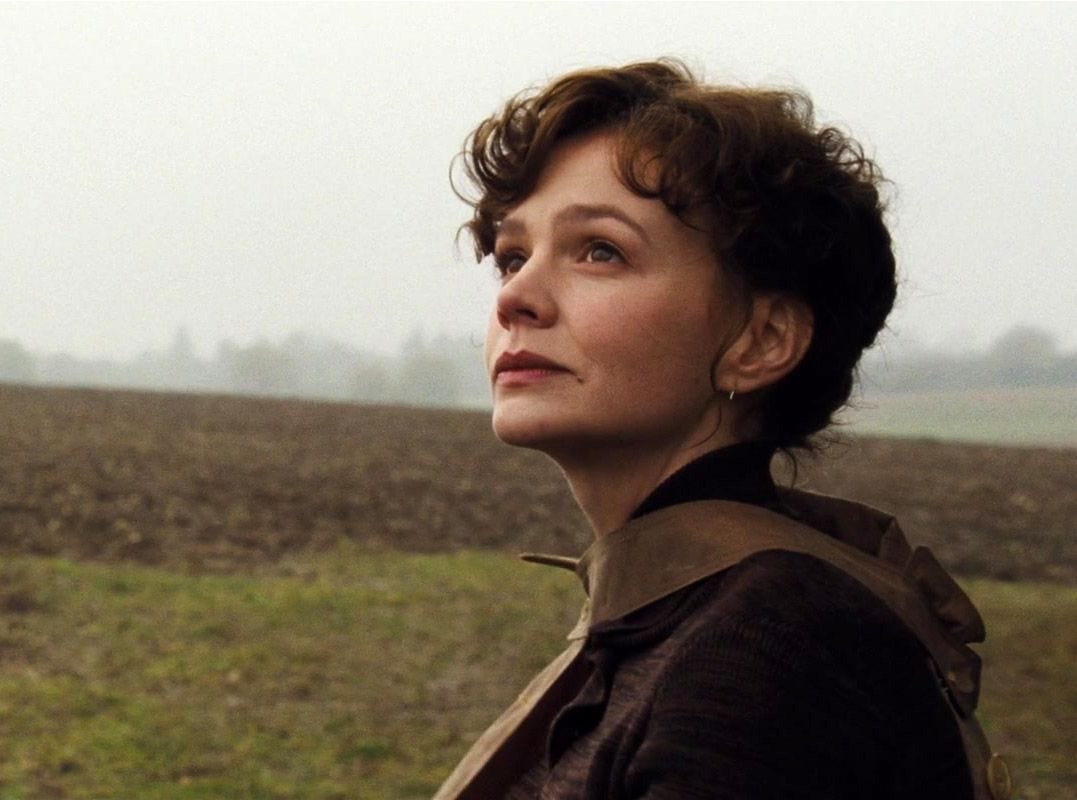Of Indecisive and Palpitating Stars
Feminism and Romance in Hardy's "Far From the Madding Crowd"
"In her distraction, instead of advancing further she walked up and down, beating the air with her fingers, pressing on her brow, and sobbing brokenly to herself. Then she sat down on a heap of stones by the wayside to think. There she remained long. Above the dark margin of the earth appeared foreshores and promontories of coppery cloud, bounding a green and pellucid expanse in the western sky. Amaranthine glosses came over them then, and the unresting world wheeled her round to a contrasting prospect eastward, in the shape of indecisive and palpitating stars."
~ Far From the Madding Crowd, Chapter 31
I was dazzled, warmed, and surprised by Thomas Hardy’s wonderful story Far From the Madding Crowd when I first watched the 2015 adaptation of the movie several months ago. The movie itself is, in one word, gorgeous. The novel is set in the fictional region of Wessex in the south of England, an agricultural landscape where many of Hardy’s novels are set. This is a place of grand, ancient estates where herds of sheep graze in the pastures nearby. There are hills and copses and fields of grain, cliffs and sea spray, and it’s all very romantic.
Full disclosure — as dearly as I love to read, I have never been the most adept with the classics. I’m apt to get either very lost or very frustrated with them. This has gotten better since I tried to read Dickens when I was 12, but I still hadn’t found a love for any classic authors — that is, until I read Thomas Hardy.
Hardy is somewhat of a literary underdog for those not well acquainted with 19th-century British literature. He is alternately cynical and poetic. He doesn’t write about smoggy London streets, stuffy drawing rooms, or swooning maidens. His books are populated with colorful country folk and stretched across beautiful bucolic landscapes. By contrast, they contain tremendous sorrow and oftentimes deal with extremely taboo subjects. There’s no telling what his characters will get up to, which you will know if you are familiar with Tess of the D’Urbevilles or Far From the Madding Crowd.
Far From the Madding Crowd definitely brings its share of surprises. What seems at first like a story about feminism proves in the end to be not about feminism at all, but rather human weakness, and female weakness in particular. It is a love story, but not the sort of romance where every step can be predicted. Characters make bad decisions and suffer consequences. And in the end, some people are given happiness, and some people end up in jail for life.
It’s a fabulous book and I can’t recommend it enough. Likewise, the 2015 movie version is quite well done and remains fairly true to the book without stretching it into a four-hour movie. (The soundtrack is also completely gorgeous.)
This is not a book review or a movie review. This is to enumerate a little more deeply on the main reason I love Far From the Madding Crowd, and that is Bathsheba and Oak, together — their natures, the friction between them, and the unusual friendship which leads to romance. If you are worried about spoilers, proceed with caution; most likely, you have already surmised (correctly) that these two will end up getting married. But this doesn’t happen until the very end of the story, and it takes a lot to get there.
We love characters who remind us of our humanity. Hero or heroine, even villain — as long as they act as we know real people would, we feel we are being told the truth. Then there are characters who remind us of truths, who are worthy of our cheering them on, and who may even remind us of ourselves in different seasons and scenarios. It’s harder to pass judgement on a character who reminds you of yourself, even if it’s your own foolishness. We can have feelings of exasperation and moments of fury, but we know they either know no better or they simply can’t help themselves. This was my reaction to Bathsheba Everdene when I first became acquainted with her.
Story background:
Bathsheba Everdene is a young woman with no living parents whose uncle leaves his farm to her after he dies. Overnight, she goes from a humble farm girl to the mistress of a large farm and everyone who lives and works on it.1 Bathsheba is beautiful, clever, capable, and for the most part considerate in her treatment of others. She has some underlying self-confidence issues, however, and one great fault — her vanity. She also has an aversion to the notion of marriage, or at least getting married to the first man who asks her, who is a shepherd named Gabriel Oak.
Keep reading with a 7-day free trial
Subscribe to Pasture People to keep reading this post and get 7 days of free access to the full post archives.






